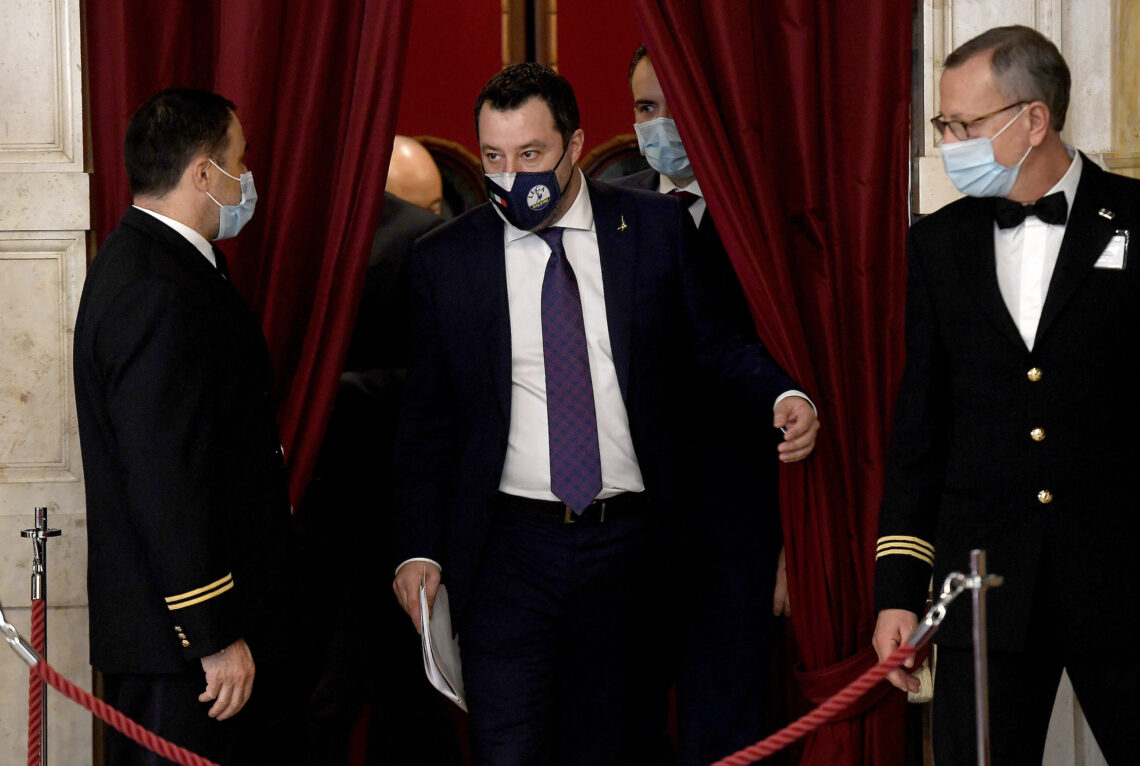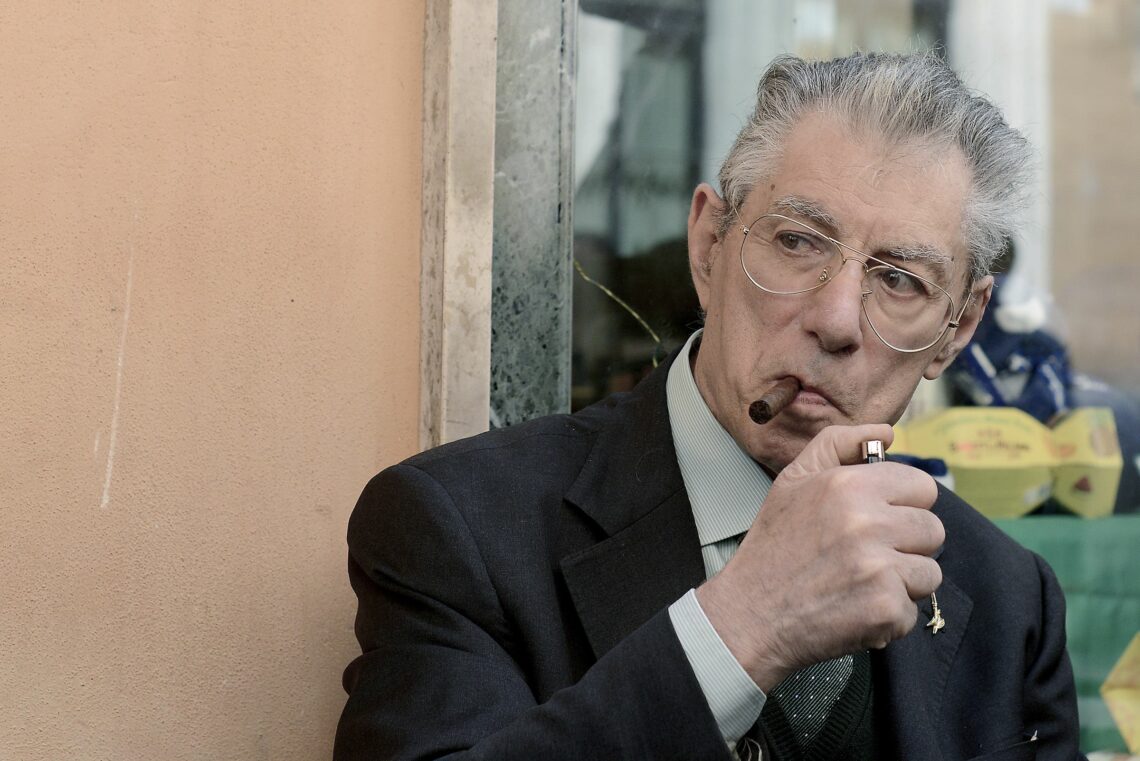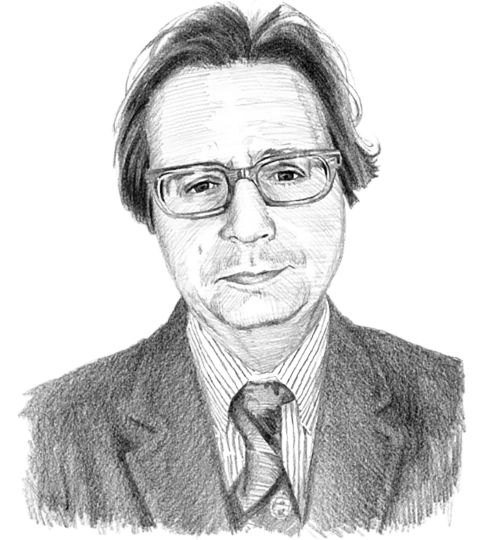Matteo Salvini: Populist or pragmatist?
Italy’s populist star Matteo Salvini has stood behind the institutionalist Mario Draghi as prime minister, in keeping with his party’s pragmatic past. While his rebellious rhetoric will continue, the Lega leader will likely keep playing the responsible politician in Rome.

In a nutshell
- Italy’s insurgent Matteo Salvini now backs the establishment Mario Draghi
- His Lega party has long thrived on pragmatic reinvention
- Salvini must balance public image with the realities of local administration
Is populism in Italy a thing of the past? As an economics professor in the United Kingdom recently wrote to me, a little surprised: “Now that Mario Draghi is prime minister, Italian politics seems, at least from abroad, to have quieted down completely.” Italians may have a different impression.
While Mr. Draghi’s government enjoys broad support in parliament, the leaders of the major parties – Matteo Salvini of the right-wing Northern League (later known as Lega), and Enrico Letta, the new secretary of the Democratic Party – are busy in a daily contest to prove that while they may back the same cabinet, they are not the same. Recently appointed to the top position among the left-wing Democrats, Mr. Letta, who was prime minister from 2013 to 2014, has been waving the flag of identity politics over a law against homophobia and transphobia, as well as discrimination related to sexual orientation, and came out with a controversial proposal to raise the estate tax.
For his part, Mr. Salvini has jumped on the notion of doing away with all or most lockdown restrictions, becoming the champion of a return to normality and thus clashing with his more cautious coalition partners.
To understand the history of the Northern League is key to try to picture what Mr. Salvini may do next.
Still, in a sense, my English friend is right. Mr. Salvini became leader of the Northern League in 2012. Since then, he embraced with consistency a certain style, rather than a precise set of policies. Regardless of circumstances, whether he is presenting to businesspeople, giving a television interview or addressing the Senate, the head of the Lega party talks as if he were the leader of an insurgency. His populism seemed instinctive and radical. A member of the European Parliament for 12 years (2006-2018), the persona Mr. Salvini constructed for himself was that of an Italian archenemy of “eurocrats,” who he caricatured as a ruling class completely out of touch with the common people. Yet he now actively supports the Italian who rose to the top of European institutions – Mr. Draghi – and whose resume, personal history and political style seem the furthest apart from any populist uprising.
Despite the daily skirmishes between right and left, neither side intends to sabotage the Draghi government. This may cost Mr. Salvini some of his support: in 2019, his party reached 28 percent of the vote. He is now polling around 24 percent, while the avowedly right-wing Giorgia Meloni and her Brothers of Italy party, allied with Lega in many local governments but which does not support the Draghi cabinet, is rising in the polls.
Northern League history
To understand the meandering path of Mr. Salvini, is important to make an appraisal – if only a sketch – of his party’s history. The Northern League (Lega Nord in Italian) was founded in the early 1980s; its founders were middle-class outcasts with little political experience, who had fallen in love with vague notions of federalism. In a country like Italy, which was unified later than most European countries and was a strict adherent of the centralized French model of government, the fact that decentralization could be a cure to some of the national ills – beginning with corruption – was apparent to outsiders of the political establishment. A strong leader soon emerged in Umberto Bossi, considered a clown and “barbarian” by many, as well as undereducated (the man was notorious for having organized three graduation parties without ever finishing his medical degree). Yet he would prove to be a visionary.
Mr. Bossi seduced the grandmaster of Italian political science, Professor Gianfranco Miglio of the Catholic University in Milan, making him briefly the ideological lantern of his party. This was the complex and exciting time of the “clean hands” investigations, which swept away Italy’s entire political class. Mr. Miglio tailored a simple and yet slightly contradictory rhetoric for the party. On one hand, he brought a conservative-leaning, free-market federalism, appealing to the small businesspeople in the north of the country, who were to become the bulk of the party’s voters.
These small but thriving entrepreneurs saw themselves as the Atlases that did not shrug. While the older political parties were oblivious to the idea that taxes could be cut and regulations lifted, they styled themselves as victims of a corrupt system, in which “unofficial” support to political parties opened the door to public contracts. Hence, these new conservative sentiments found expression in a revolutionary and sometimes even Jacobin language, which considered the rule of law as little more than an afterthought and called for a radical upheaval.

In 1994, however, Silvio Berlusconi entered politics, monopolized opposition to high taxes, presenting himself as a more credible candidate for reform: a man with strong business credentials who could also wear a necktie. Mr. Miglio was cast aside by Mr. Bossi when the professor’s popularity proved too high with party members, and the non-graduate physician found himself beleaguered by Mr. Berlusconi’s success and money. Mr. Bossi then proved to be a first-class politician: he conspired against his ally, kicked him out of the government, made friends with the left for a brief period (the Northern League was then labeled “a rib of the left” by former communist leader Massimo D’Alema) – and then, in the 1996 elections, galvanized his base against both the right and the left with a secessionist platform.
As a good student of politics, Mr. Bossi tried to forge political symbols anew, by christening a never-existing “country of the North of Italy” (Padania) and even inventing a semi-mythical status for the Po River that crosses it.
Conservative economics
As romantic as all this sounds, Mr. Bossi’s economics were sounder than most: low taxes, low regulations, and he even called for the north to pay off all of Italy’s public debt as the price for secession. The bet was that the country as it stood could never join the euro, whereas that prospect would have been easy for Piedmont, Lombardy and Veneto if left alone. This was a rather rational analysis; but politics is not the realm of rationality, as Mr. Bossi knew well.
After the center-left government led by Romano Prodi succeeded in being the entry ticket for the Italian adoption of the euro, the Northern League experienced another mutation. The archly secular Mr. Bossi became a champion of Christianity against Islam, to the point of supporting Yugoslavia’s strongman President Slobodan Milosevic against fellow secessionists in Kosovo. Then, before the 2001 elections, he forged a new pact with Silvio Berlusconi, who forgave the betrayal and the many insults traded during the preceding years.
Salvini’s job is to keep the show going on, both on the stage and behind the scenes.
All of the above was explained, at the time, by making reference to the many different groups of political activists who found a home in the Northern League after roaming around left and right. But Mr. Bossi was an adventurer, not an ideologue. He opportunistically kept the messages that he thought he could use to rouse popular support, changing the topic but never the tone of his rhetoric.
Alongside its populist leader, once they joined the Berlusconi coalition, the lieutenants of the Northern League found themselves in need of a territorial organization and of politicians capable of governing municipalities and provinces. For all the twists and turns of its leader, the Northern League developed an apparatus much in line with the older tradition of the political parties it opposed and eventually buried. The pyrotechnic rhetoric went together with the no-frills administration of local governments.
This is the reason why the party was shocked when Mr. Bossi, already damaged by a stroke, was charged with corruption and nepotism. The electorate had a sudden epiphany: the League had pointed to different promised lands but never reached any because its leaders were simply enjoying the journey. The party’s support started to dwindle and its fate appeared sealed.
From gravedigger to insurgent
When Mr. Salvini was elected secretary in 2012, he was expected to be the gravedigger. But he had learned the lesson of his master too well: he remembered that the good days were those of the insurgency and tried to return to that spirit. He did not support the government led by the Milanese Mario Monti to heal the country’s public finances. He searched for a crusade and found it in the immigration issue. He flirted with anti-euro economists and became a champion of not cutting public spending and not dealing with the public debt, against “austerity.” He trained his aim on the south of Italy and gained substantial support in the once-inhospitable parts. But his rhetorical tightrope walking was also instrumental in reinvigorating a local ruling class that has been administering cities and regions in the north for more than 15 years.
His rhetorical tightrope walking was instrumental to reinvigorating a local ruling class.
When the opportunity came to govern with the eccentric left-wing populists of the Five Star Movement, Mr. Salvini jumped on it, managing to present himself as the sane part of the coalition. While in hindsight the effort did not work, the 2019 electoral success proved that in such circumstances a good chunk of the electorate found the proposition credible. During the (however complex) operations of that cabinet, Lega’s local leaderships experienced something it had been missing since 2011: some fellow party members who, from the inner rooms of the ministries, could be of help.
When it appeared that Mario Draghi could, surprisingly, be interested in succeeding Giuseppe Conte as prime minister in February, Mr. Salvini quickly realized that his fellow party members with local leadership responsibility would never forgive him for not jumping on the bandwagon – particularly because the new government was set to allocate 190 billion euros of the EU’s Covid-19 recovery funds. Plus, the Lega leader quickly realized that supporting Mr. Draghi as prime minister could be his reprieve for his older, abrasive criticisms of the euro and the eurocrats. Crucially, it could gain him the necessary credibility to be accepted, one day, as a prime minister by other EU member states.
Scenarios
To understand the history of the Northern League is key to try to picture what Mr. Salvini may do next. He knows his movement is capable of reinventing itself, as an insurgency against an ever-changing interpretation of the status quo. The gifts of Jacobin rhetoric are ones he still holds dear. But he also knows that this rebellious talk is a facade, for voters like him to voice their irritations but also to be capably administered by quieter members of the party. His job is to keep the show going, both on the stage and behind the scenes.
At the European level, Mr. Salvini is flirting with an alliance with Hungarian leader Viktor Orban and Polish Prime Minister Mateusz Morawiecki. The three are certainly an unholy trinity for the identity politicians of the left. Yet it is difficult to rule out a coup de theatre, with Mr. Salvini joining the European Popular Party before the next Italian election – particularly if Mr. Berlusconi, aged and sick, does not run and his Forza Italia party consequently vanishes. Mr. Salvini’s meeting with Prime Ministers Orban and Morawiecki in April was partly the result of his supporting Mr. Draghi, balancing the need to keep the populist mask on while playing the responsible politician in Rome.
It is unclear when Italy will hold its next parliamentary vote: in 2022, after the election of the new head of state, or in 2023, when the Parliament’s term is set to expire. A reform has cut the chamber from 945 to 600 seats; meaning even the prospective winner will not be in a position to promise seats to new supporters. Knowing his backing of Prime Minister Draghi may hurt his electoral prospects, Mr. Salvini may be less eager for elections than he was a few months ago. If Mr. Draghi is replaced in 2022 (possibly because he is elected president of the Republic), Mr. Salvini may be tempted to spend a year in the opposition. Joining the EPP could then be the way to reinforce his credibility as a prospective premier.
At least one thing is possible to forecast: Mr. Salvini will do whatever it takes to retain his populist talk and maintain the local administration record of his party. He knows Lega is the dog that barks and never bites. Barking is his art, each time choosing the most convenient tree.








